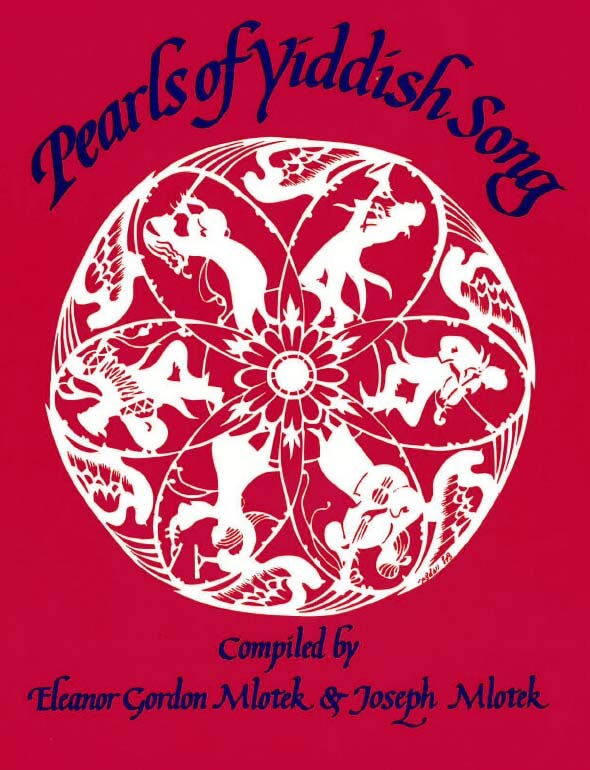Love song popular in the United States and Europe in the 1930’s. Words by Aliza Greenblatt 1888-1975, written in 1933; melody based on an Israeli tune. Words and music published in the poet’s collection Tsen lider.
In her memoirs, Aliza Greenblatt notes that the Yiddish poet Jacob Glatstein referred to her as the only Yiddish woman troubadour. She traveled throughout the United States giving song recitals, not unlike her son-in-law, the famous balladist, Woody Guthrie, and her grandson, Arlo Guthrie.

I walk near the edge of the sea and seek you everywhere. A gentle wave murmurs softly the magic of your voice.
Refrain:
You, you — the most delicate of flowers,
You, you, you, you — in all my dreams.
You, you.
The skies expand in the distance and a breeze touches the shore.
The breezes whisper a heavenly melody, and longing flutters deep in my heart.
Take my longing, gentle breeze, and carry my greetings to him. Tell him I long for him so, that I am dying of longing.
Kh’gey arum baym breg fun yam,
Un zukh dikh alts arum,
A shtile khvalye murmit koym
Dem tsoyber fun dayn shtim.
Refrain:
Du, du,
Fun ale tsarte blumen,
Du, du, du, du,
Fun ale mayne troymen,
Du, du.
Shpreytn zikh di himlen oys,
Het gants vayt avek,
Kumt a vintele tsu geyn
Un klapt on baym breg.
Soyden zikh di vintlekh shtil
Mit getlekhn gezang,
Un in hartsn tif bay mir,
Flatert a farlang.
Nemt mayn benkshaft, vintlekh, oyf
Un trogt avek a grus,
Zogt im az ikh benk azoy,
Kh’gey fun benkshaft oys.
כ’גײ אַרום בײַם ברעג פֿון ים,
און זוך דיך אַלץ אַרום,
אַ שטילע כװאַליע מורמלט קױם
דעם צױבער פֿון דײַן שטים.
רעפֿרײן:
דו, דו,
פֿון אַלע צאַרטע בלומען,
דו, דו, דו, דו,
פֿון אַלע מײַנע טרױמען,
דו, דו.
שפּרײטן זיך די הימלען אױס
העט גאַנץ װײַט אַװעק,
קומט אַ װינטעלע צו גײן
און קלאַפּט אָן בײַם ברעג.
סודען זיך די װינטלעך שטיל
מיט געטלעכן געזאַנג,
און אין האַרצן טיף בײַ מיר,
פֿלאַטערט אַ פֿאַרלאַנג.
נעמט מײַן בענקשאַפֿט, װינטלעך, אױף
און טראָגט אַװעק אַ גרוס,
זאָגט אים אַז איך בענק אַזױ,
כ’גײ פֿון בענקשאַפֿט אױס.
Song Title: Du, Du

First published in 1988 as Pearls of Yiddish Song: Favorite Folk, Art and Theatre Songs, this anthology contains 115 songs. Some material had never been published, while others, included in rare song collections or sheet music, were largely inaccessible. The songs presented reflect Jewish life in Eastern Europe and the United States and depict childhood, love, family celebrations, poverty, work and struggle. There are also songs from the Hasidic and Maskilic movements, songs of Zion and of America, as well as songs from the Yiddish theater.
The title of this anthology derives from the weekly two-page feature column “Pearls of Yiddish Poetry,” which the compilers Yosl and Chana Mlotek initiated in 1970 in the Yiddish newspaper Der Forvertz (the Yiddish Daily Forward). Hundreds of readers from around the world — including authors, composers, singers, actors — became co-participants in this collective folk project and recalled melodies, lines, fragments, stanzas and their variants of songs, poems, and plays which they had heard in their youth. At first, readers sent in only written material. Later, they also taped songs on cassettes, many of whose melodies had, until then, never been recorded. They also identified and supplied missing information regarding lyricists, poets, and composers and described the circumstances surrounding the songs’ origins, their dissemination, diffusion and impact.